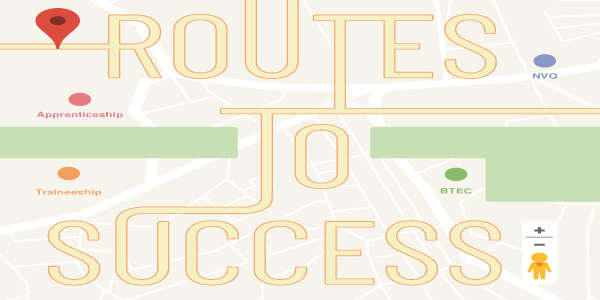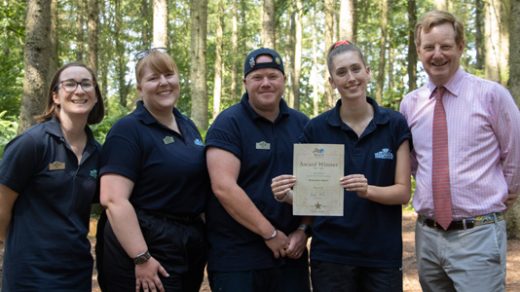Routes to success – further education

Hundreds of thousands of students between the ages of 16-18 will be making key decisions that could affect their futures over the next few months.
By Jack Poland
For many, these decisions will involve exams such as GCSEs or A-levels.
For others, about as many as those who stay on in traditional education in fact, the focus will be on pursuing an alternative route to future success.
For every student who chooses to stay in education to the point of taking A-levels, there is approximately another student who does not.
The road to exam day and beyond is well documented but what are the options for those who seek their learning elsewhere?
APPRENTICESHIPS
Perhaps the most heralded and popular alternative to higher education, apprenticeships are a hands-on, learn-on-the-job process that have seen a resurgence in the last decade.
Despite a drop in numbers in recent years, the Government has planned to create three million apprenticeships by 2020. Ambitious perhaps but it’s certainly a clear indicator of how important apprenticeships are viewed in influential corners.
So, what exactly are apprenticeships and what makes them an attractive alternative?
• Essentially a job in which you learn all of the skills you need in the field of work you have chosen.
• They are an opportunity to earn a wage. Unlike students who may have to find a casual job to pay their way through studies, apprentices earn while they learn and, of course, work.
• It is a chance to broaden your skill set and acquire valuable knowledge whilst working alongside experts and experienced colleagues.
• It’s clear that apprenticeships are a solid alternative to A-levels and beyond yet, like with all decisions that could should shape your future, they’re not perfect for everyone.
What are the potential downsides of apprenticeships?
• Less pay. Despite earning while you learn, the pay itself can be generally lower than the national minimum wage. At £3.90 per hour, the standard rate of pay for a 16 to 18-year-old apprentice is 45p less than a non-apprentice of the same age.
• Lack of career flexibility. The specific nature of apprenticeships can mean that changing your mind on a career is a much more difficult choice than for those who have an open-ended qualification elsewhere.
• Less time. With the benefits of full-time employment comes the pitfalls. Unlike students of the same age, apprentices will often be given the national holiday allowance – 28 days or 5.6 weeks.
TRAINEESHIPS
Traineeships are courses that most often include a work-placement. They also involve training in writing CVs, interview preparation and other life and work skills that perhaps aren’t available on other, more specific, educational paths.
Traineeships provide a lot of the benefits of being an apprentice but allow for a larger degree of flexibility and choice. Though they can last up to six months, there is less of a commitment involved with traineeships which is why they are an attractive route for many.
Here’s a small breakdown of why traineeships might be for you:
• They are free. The government directly pays your training provider for your time.
• You will get solid job training of up to 100 hours.
• The course can be tailored to your needs and those of the local labour market.
• You don’t need any qualifications to apply, just a keen motivation to work and learn.
• Financial support is available for travel, childcare or for those with a disability.
So there we have the benefits of traineeships but are there any reasons why you might want to look elsewhere for further education?
• Pay or lack of it. Your training provider is under no obligation to pay you for your work placement.
• While traineeships are similar to apprenticeships, they simply aren’t the same thing. Traineeships just will not have the same experience as someone who has done an apprenticeship in the same industry. This could become an issue when it comes to fighting off competition for a job in the future.
BTECs
BTECs, which stands for Business and Technology Education Council, are essentially work-related qualifications.
From their inception in 1984, BTECs have been offered for those at pre-GCSE level to degree equivalent but what are they and who exactly should be considering them?
• Unlike apprenticeships, BTECs are particularly useful for those who are not completely sure about what path they want to take.
• BTECs aren’t all-or-nothing. They can be taken alongside other studies, apprenticeships or indeed as a stand alone course.
• There are plenty of choices. With around 2,000 qualifications across 16 sectors, from engineering to performing arts, BTECs provide a deep pool of options.
• There are three different types of BTEC: BTEC Firsts (similar to GCSE standard), BTEC Nationals (similar to A-level standard) and BTEC Apprenticeships which are available across 25 sectors.
• BTECs are clearly a happy middle ground for those torn between traditional education routes and wanting to learn more about a specific industry or sector.
Of course, BTECs aren’t for everyone. Here are some of the reasons a BTEC might not be for you:
• It involves lots of exams. For anyone hoping that choosing a BTEC over GCSEs and A-levels means never having to face examinations again, think again. BTECs involve plenty of small examinations along the way.
• They can take up time. Whether you are completing the BTEC alongside other studies or an apprenticeship, they can be a time-consuming venture. This could be all the more frustrating if you still aren’t sure about your future goals.
NVQS
National Vocational Qualifications pretty much do what they say on the tin. Like apprenticeships, NVQs tend to be suited best for those who know what sector or industry they wish to work in and are looking to build on their skill set.
For success in NVQs the candidate must demonstrate and prove their competency in their chosen role or career path.
There are five levels of NVQ qualifications and candidates can start at any level they feel suited to best. For example, if you are looking to hone your skills in a job you are already in, one of the higher levels might be for you. Alternatively, if you are taking the NVQ as part of a college course then a lower level may be the best option.
So, what are the benefits of taking an NVQ?
• A bit like with BTECs, there are plenty of options. NVQs cover a wide range of subjects for almost every occupational area in every business sector.
• No exams. Assessments are based on a candidate’s portfolio of work as well as observations to make sure candidates are up to scratch whilst on the job. Note also that no exams doesn’t mean no certification.
• NVQs don’t have to be completed in a specific amount of time, however most people find it takes about a year to complete an NVQ level.
Clearly there are plenty of reasons why attaining an NVQ is an attractive proposition. However they might not be for everyone. Here’s why:
• Unlike apprenticeships, NVQs don’t get a full-time in-work education. Whilst this might suit those for whom time is an issue, it can make job hunting difficult when you are competing with candidates who have many more hours of experience.
• NVQs can be specific to a specialised field. This means that, for some, the qualification needs to be regularly updated in order to keep up with the ever-changing nature of the industry itself.
• The specificity can also be a problem if you change your mind on the type of industry you wish to work in. This is less of an issue than in an apprenticeship as you won’t have invested as many hours.



